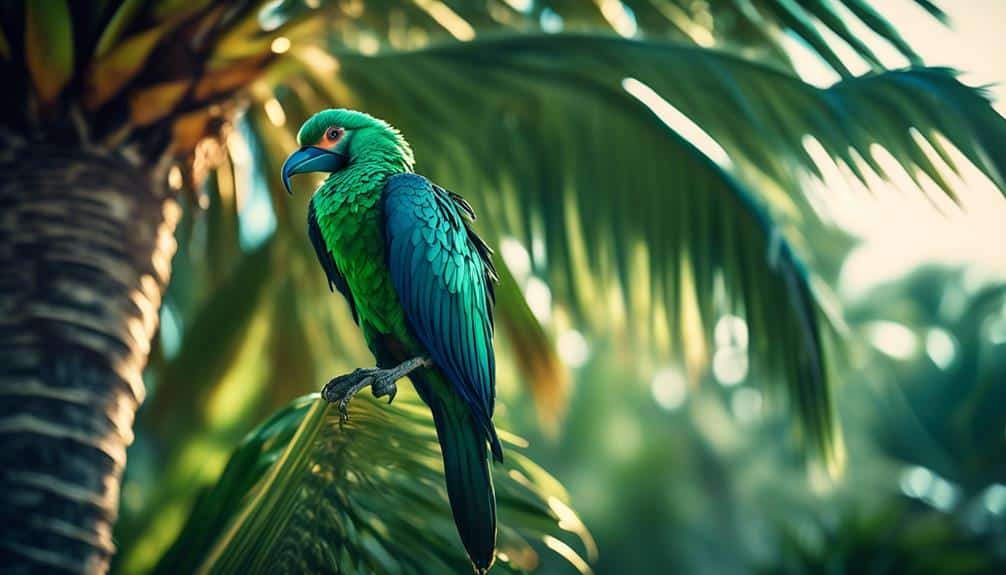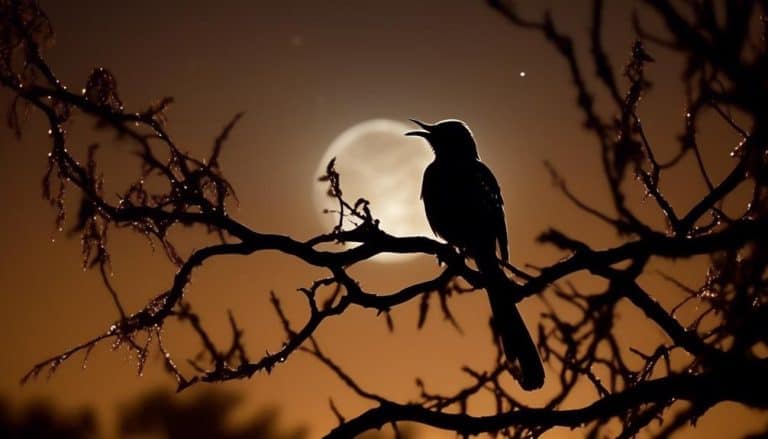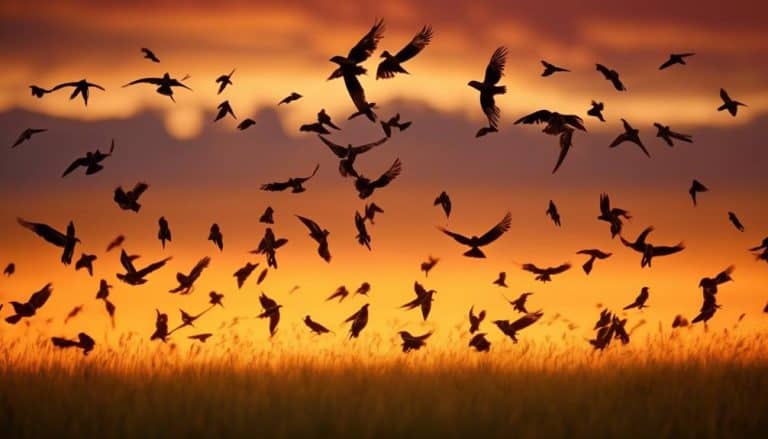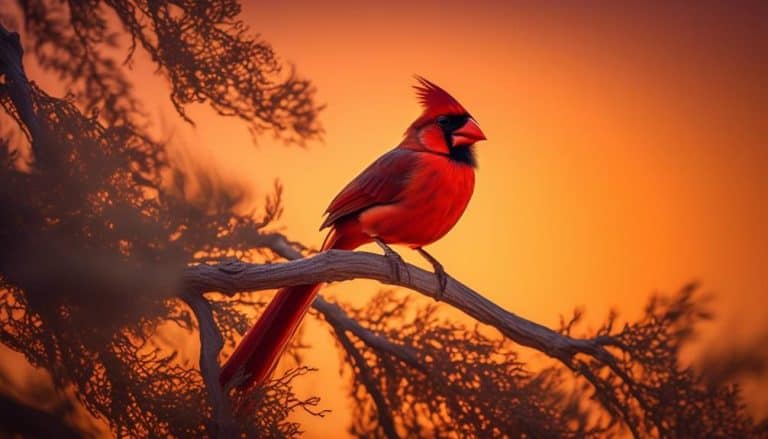A vibrant flash of emerald caught my eye as I strolled along the lush, sun-kissed trails of Florida’s diverse ecosystems. Green birds and hidden treasures amidst the foliage captivated my attention. It’s time to discover the Green Birds in Florida.
Yes, there are green birds in Florida, including the elegant Green Heron and the tropical delight of the Green Parakeet. Their unique characteristics and vibrant plumage add a sense of wonder and beauty to the state’s natural landscapes. The Green Birds in Florida are not currently considered endangered, and they communicate with each other through different mating behaviors, vocalizations, and calls.
Their ethereal beauty and unique characteristics fascinated me, leading me to uncover the secrets behind these avian wonders. From elegant hunters to tropical delights, these green birds have stories that beckon to be unveiled, offering a glimpse into the captivating world of Florida’s feathered inhabitants.
But what makes these birds truly remarkable? Stay tuned as we discover these green creatures’ hidden wonders and extraordinary lives.
Green Heron: An Elegant Avian Hunter
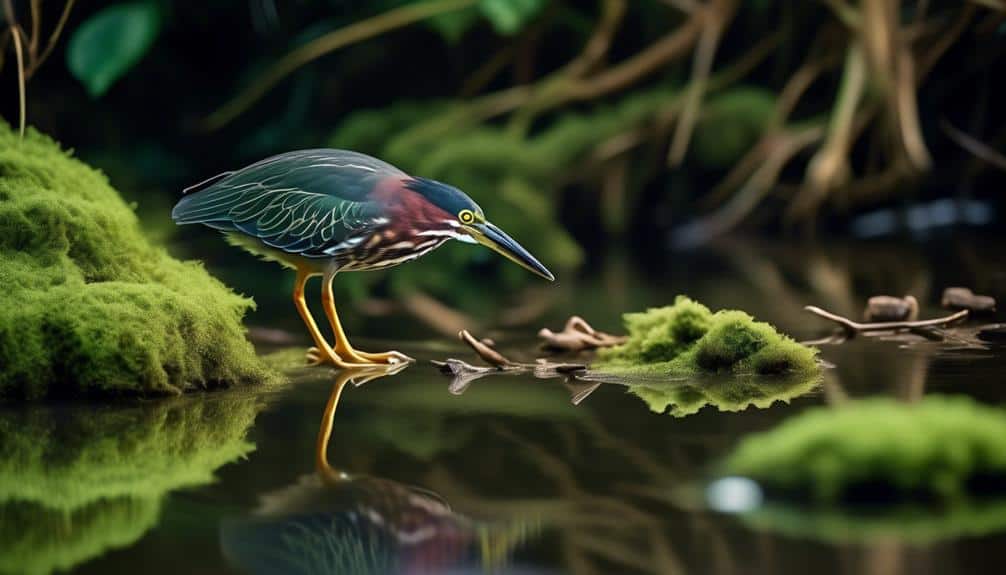
The Green Heron, a masterful and skillful avian predator, gracefully stalks its prey with precision and finesse. With its elegant hunting techniques and keen instincts, this avian marvel is a true marvel of nature. The Green Heron, scientifically known as Butorides virescens, is a medium-sized heron in wetland areas across North and Central America.
The feeding habits of the Green Heron are diverse and adaptable. Equipped with a sharp beak and agile body, it preys on various aquatic creatures, including fish, frogs, insects, and even small mammals. Its primary hunting technique involves patiently waiting motionless, blending seamlessly with its surroundings, until the perfect moment to strike. With lightning-fast reflexes, it extends its neck and darts its head forward, snatching its unsuspecting prey with astonishing accuracy.
The Green Heron’s feeding strategies go beyond mere hunting skills. It has been observed using tools, such as bait, to lure fish within striking range. Dropping insects or small objects onto the water’s surface entices fish to investigate, giving the heron an advantage in capturing its meal.
Green Parakeet: A Tropical Delight
Occasionally fluttering through the vibrant tropical landscapes of Florida, the Green Parakeet brings a burst of color and an enchanting melody to its surroundings. This tropical bird species is a true delight, with its vibrant plumage and joyful songs.
- The Green Parakeet’s vibrant plumage is a sight to behold, with shades of bright green adorning its feathers. This striking coloration helps the bird blend seamlessly into the lush foliage of its habitat, providing excellent camouflage from predators.
- These parakeets are known for their melodious calls, which echo through the forests and add to the tropical symphony of sounds. Their enchanting melodies are a true delight to the ears, captivating both birdwatchers and nature enthusiasts alike.
In addition to their colorful appearance and enchanting songs, Green Parakeets play a crucial role in the ecosystem. Through their feeding habits, they help disperse seeds and contribute to the growth and diversity of plant species. This ecological role ensures the continued vitality of the tropical landscapes they call home.
Encountering a Green Parakeet in the wild is a rare and special experience. Their vibrant plumage and enchanting melodies make them a true tropical delight, adding a touch of magic to the already vibrant landscapes of Florida. So, next time you find yourself in the lush forests of the Sunshine State, keep an eye out for these beautiful birds and let their presence transport you to a tropical paradise.
Painted Bunting: Nature’s Living Rainbow
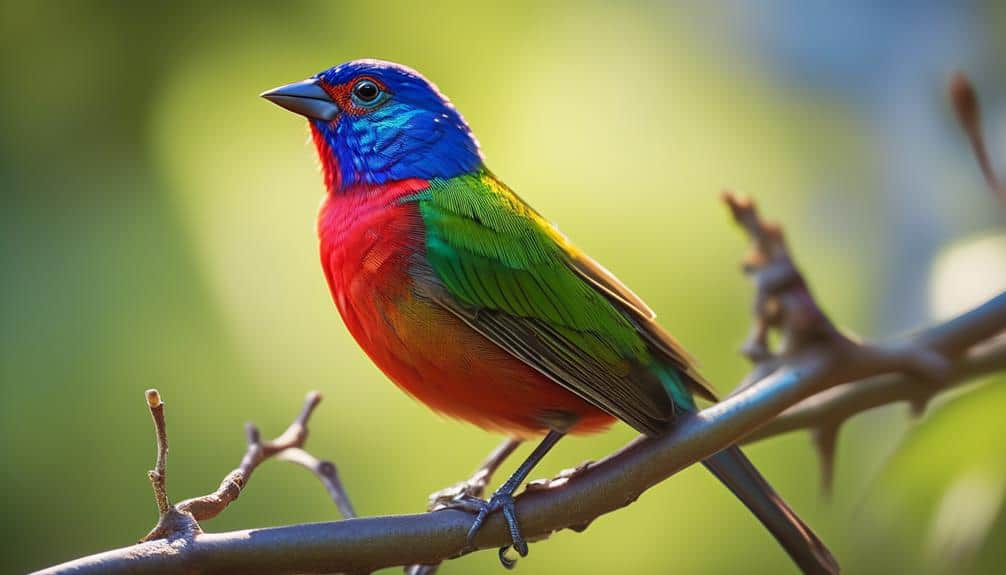
With its vibrant plumage and diverse range of colors, the Painted Bunting is a true spectacle of nature’s living rainbow. This small bird, known scientifically as Passerina ciris, is native to North America and is particularly famous for its striking appearance. The male Painted Bunting is a sight to behold, with its bright blue head, red breast, and greenback. Combining these colors creates a mesmerizing display unique in the avian world.
The colorful plumage of the Painted Bunting serves several important purposes. First and foremost, it’s an important aspect of mate attraction. The bright and vivid colors of the male bunting are intended to impress potential mates and signal his fitness and genetic quality. Additionally, the plumage also serves as a form of camouflage, helping the bird blend into its surroundings and evade predators.
Spotting a Painted Bunting in the wild is a rare sighting indeed. These birds are highly elusive and tend to inhabit dense thickets and shrubby areas, making them difficult to observe. They’re also known for their secretive behavior and tend to stay hidden amongst the foliage. However, patient birdwatchers willing to spend time in the right habitat may be rewarded with seeing these magnificent creatures.
Mangrove Cuckoo: A Camouflaged Treasure
The Mangrove Cuckoo, a master of camouflage, effortlessly blends into its coastal habitat with its subtle and intricate plumage. This hidden hunter, with its vibrant plumage, is a true treasure of the mangrove forests in Florida. Here are some fascinating facts about this elusive bird:
Adaptations for Camouflage:
- The Mangrove Cuckoo’s plumage is predominantly brown, allowing it to blend seamlessly with the tree bark and foliage in its surroundings.
- Its feathers are streaked with black and white, providing additional camouflage and breaking up its outline.
Stealthy Hunting Techniques: - The Mangrove Cuckoo is a skilled predator, often preying on insects, spiders, and small reptiles.
- It uses its keen eyesight to spot its prey and then silently swoops to snatch its unsuspecting meal.
With its ability to blend into the environment and its exceptional hunting skills, the Mangrove Cuckoo exemplifies the wonders of nature’s intricate adaptations.
This bird isn’t only a camouflaged treasure and a vital part of the coastal ecosystem. Controlling the populations of insects and small animals helps maintain the delicate balance of the mangrove forests.
White-crowned Pigeon: Florida’s Sublime Forest Dweller
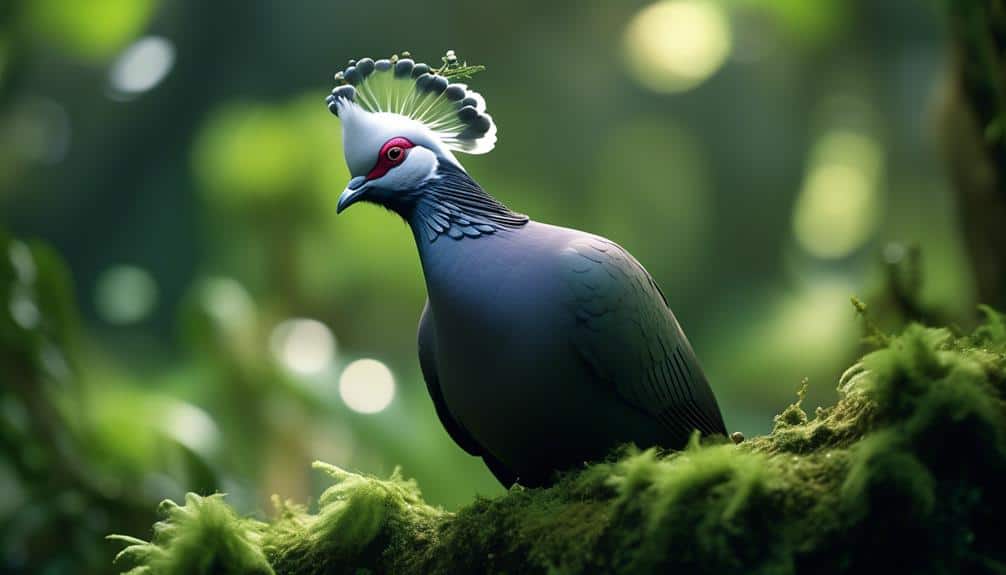
The White-crowned Pigeon, an emblem of Florida’s sublime forest-dwelling, exhibits remarkable ecological significance with its unique characteristics and vital role in the local ecosystem.
As a resident of Florida’s unique pigeon species, the white-crowned pigeon possesses fascinating behaviors that contribute to its survival and the overall health of the forest ecosystem.
One notable behavior of the white-crowned pigeon is its preference for nesting in the dense foliage of mature hardwood trees. These trees provide ample cover and protection for the pigeons and their nests, shielding them from predators and harsh weather conditions. The pigeons’ choice of nesting habitat also helps maintain the forest’s integrity by promoting the growth and regeneration of these important tree species.
Another captivating behavior of the white-crowned pigeon is its feeding habits. These pigeons primarily feed on the fruits of native trees, such as the gumbo limbo and wild coffee. By consuming these fruits, the pigeons play a crucial role in seed dispersal, helping to propagate these tree species and ensure their continued presence in the forest.
The white-crowned pigeon’s fascinating behaviors and ecological importance make it an integral part of Florida’s forest ecosystem. By understanding and protecting these unique pigeon species, we can contribute to the conservation and preservation of Florida’s natural heritage.
Frequently Asked Questions
How Long Do Green Birds Typically Live in Florida?
Green birds’ lifespan varies depending on the species and environmental factors. They typically live between 5 to 10 years, but they may live longer in Florida, where the climate is favorable.
Are Green Birds in Florida Endangered or at Risk?
Green birds in Florida are not currently considered endangered or at risk. However, conservation efforts are important to ensure their population remains stable and their habitats are protected for future generations.
What Is the Diet of Green Birds in Florida?
The diet of green birds in Florida consists mainly of fruits, seeds, insects, and nectar. Their diverse palate allows them to adapt to different habitats and find food sources year-round.
Do Green Birds in Florida Migrate During Certain Seasons?
During certain seasons, green birds in Florida migrate to different locations. Their migration behavior is influenced by food availability and climate changes. Understanding their habitat and behavior helps in studying their migration patterns.
How Do Green Birds in Florida Communicate With Each Other?
Green birds in Florida communicate with each other through different mating behaviors, vocalizations, and calls. Their unique vocalizations serve as a means of attracting mates, defending territories, and establishing social hierarchy within their population.
Conclusion
In conclusion, Florida is home to a vibrant array of green birds that add a splash of color to its diverse ecosystems.
From the elegant Green Heron, with its stealthy hunting techniques, to the tropical delight of the Green Parakeet, these avian creatures bring a sense of wonder and beauty to the state’s natural landscapes.
The Painted Bunting is like a living rainbow with its vibrant plumage, while the Mangrove Cuckoo blends seamlessly into its surroundings.
Lastly, the White-crowned Pigeon thrives in Florida’s sublime forests, a true treasure of this ecological wonderland.

